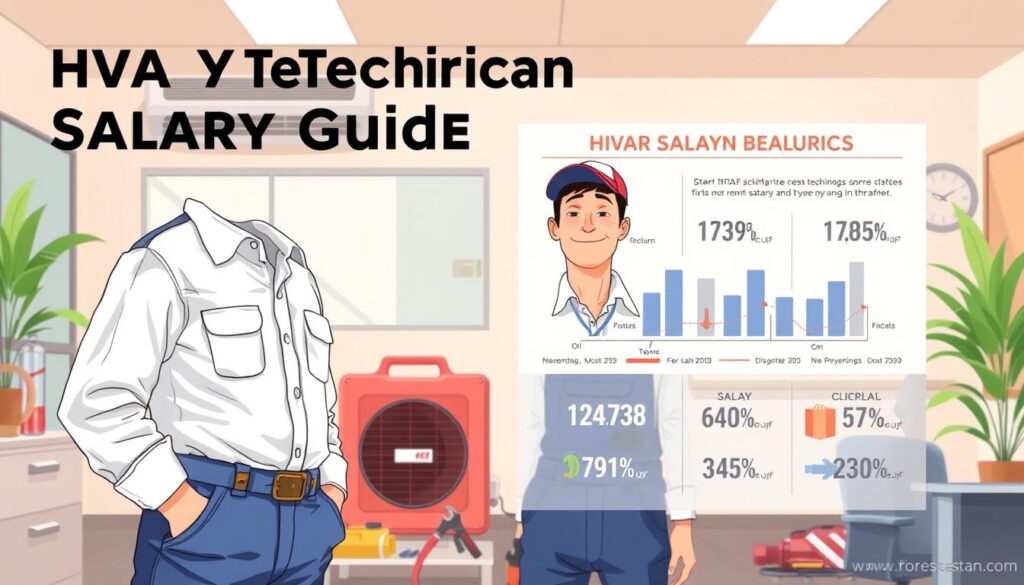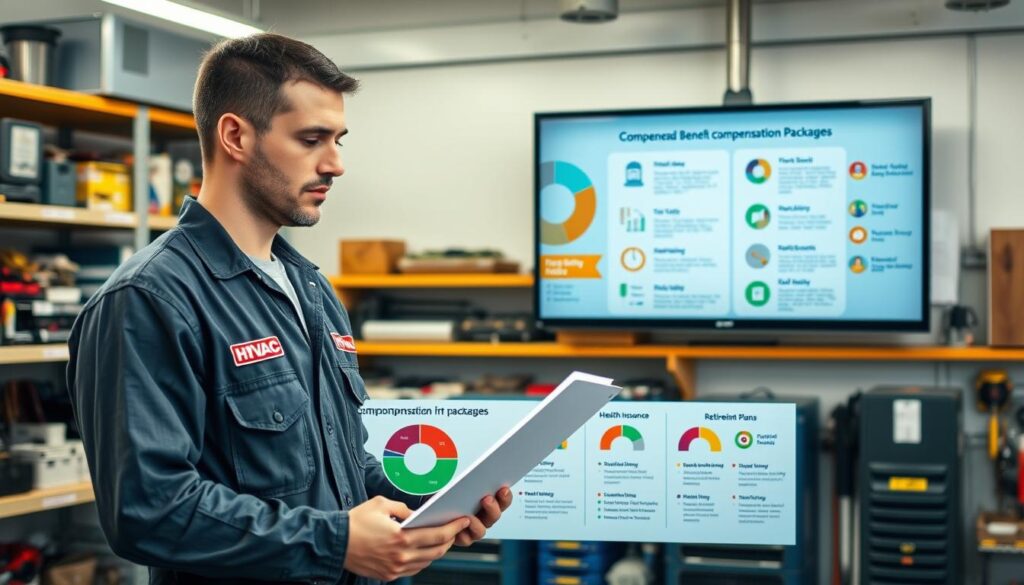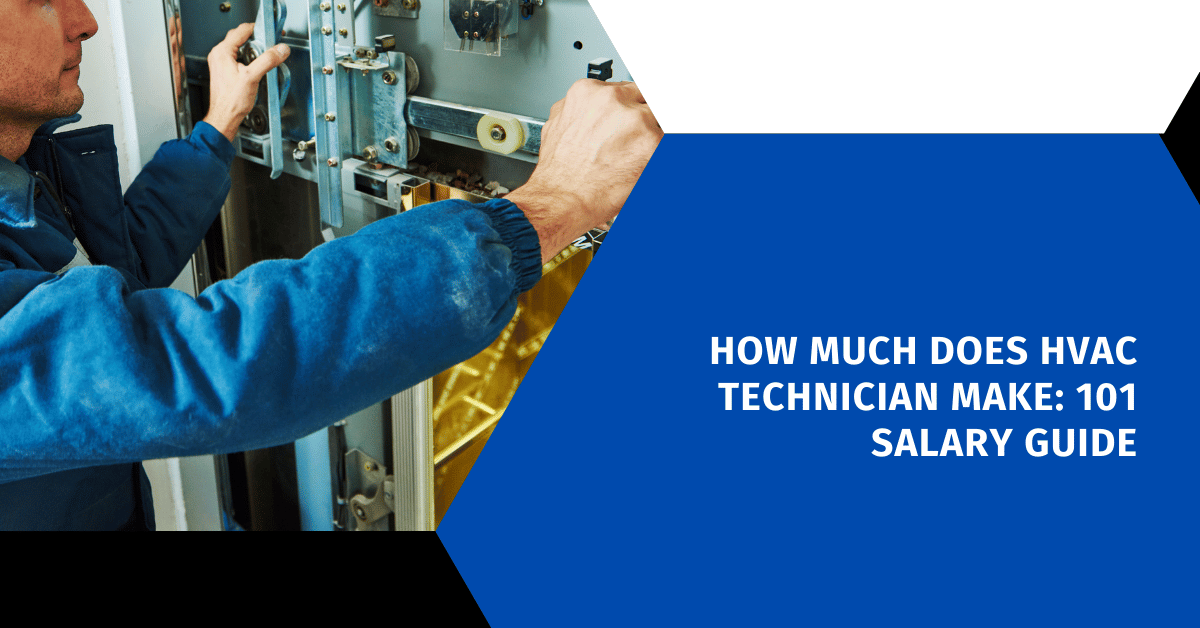Affiliate Disclosure
HVAC Guide Guys is a participant in the Amazon Services LLC Associates Program, an affiliate advertising program designed to provide a means for sites to earn advertising fees by advertising and linking to Amazon.
How Much Does HVAC Technician Make? Ever wondered how much HVAC technicians make? They keep our homes cozy, but their work is more than just fixing systems. It’s a career with great financial rewards.

HVAC technicians are key to keeping the U.S. comfortable, says the Bureau of Labor Statistics. They earn a median of $51,550 a year, as of May 2020.
To understand HVAC technician salaries, we must look at experience, location, specialization, and demand. This guide will explore the salary range for HVAC jobs. It shows how technical skills can lead to good pay.
Key Takeaways
- HVAC technicians have a median annual wage of $51,550
- Salary varies based on experience, location, and specialization
- Growing demand for energy-efficient systems increases job opportunities
- Certification and additional skills can boost earning
- Career offers stable income with advancement chances
Table of Contents
Understanding HVAC Technician Career Overview
The HVAC industry is full of exciting career paths for those who love technical work and solving problems. HVAC technicians are key to keeping places comfortable. They work in homes, businesses, and industrial settings.
Exploring HVAC tech income reveals a dynamic career with great growth chances. The Bureau of Labor Statistics predicts a 15% increase in HVAC installer jobs by 2029. This is much faster than many other jobs.
Job Responsibilities and Required Skills
HVAC technicians handle complex systems. Their daily tasks include:
- Installing new HVAC equipment
- Diagnosing system malfunctions
- Performing routine maintenance
- Repairing refrigeration and climate control systems
Essential Professional Skills
For good HVAC installer wages, you need to develop key skills. These include:
- Technical troubleshooting
- Mechanical aptitude
- Customer service
- Physical stamina
- Attention to detail
Education and Certification Requirements
To start this career, you’ll need:
- High school diploma or equivalent
- Vocational training program
- State-specific certification
- EPA refrigerant handling certification
“The HVAC industry offers stable employment and competitive compensation for skilled technicians.” – Industry Expert
Your HVAC career success depends on ongoing learning, technical skills, and professional growth.
Explore Our HVAC Shop
Looking for top-rated HVAC tools, parts, and accessories? Visit our shop and find the perfect solution for your needs.
Visit the ShopAverage HVAC Technician Salary in the United States
Thinking about becoming an HVAC service technician? Knowing how much you can earn is key. The average salary for HVAC repair technicians is about $49,535 a year, based on recent surveys.
Your salary can change based on a few important things. Let’s look at the salary landscape:
- Entry-level jobs start around $36,000
- More experienced technicians can make up to $65,000 a year
- Those with specialized skills can earn even more
Here’s a detailed salary breakdown:
| Experience Level | Annual Salary Range | Typical Opportunities |
|---|---|---|
| Entry-Level | $36,000 – $42,000 | Residential installations |
| Mid-Career | $45,000 – $55,000 | Commercial and industrial projects |
| Senior-Level | $55,000 – $65,000 | Management and specialized consulting |
Your salary can go up with more certifications and skills in HVAC repair. Things like where you live, demand in your area, and your skills matter a lot for your pay.
Pro Tip: Keep improving your skills to boost your HVAC service technician pay.
Keep in mind, these numbers are averages. Your actual earnings can vary based on local job market and your qualifications.
How Much Does HVAC Technician Make Based on Experience Level
Your salary as an HVAC technician can really grow as you gain more experience. It’s important to understand how your earnings can change over time. This knowledge helps you plan your career in this exciting field.
As you get more experienced, your pay goes up a lot. Those who keep learning and improving their skills see big salary increases. This is true throughout their careers.
Entry-Level Salaries (0-3 years)
At the start of your HVAC career, your salary is based on your basic skills. New technicians usually make about $36,614 a year. Several things affect these starting salaries, including:
- Basic technical knowledge
- Limited hands-on experience
- Entry-level certifications
Mid-Level Salaries (4-9 years)
With more experience, you become more valuable in the market. Mid-level HVAC technicians can earn between $44,743 to $50,037. At this point, you’ll have:
- Advanced technical skills
- Customer service expertise
- Specialized knowledge in specific HVAC systems
Senior-Level Salaries (10+ years)
Experienced HVAC pros with over a decade of work earn impressive salaries. They make between $55,178 and $61,101. At this level, your skills are highly valued. This shows years of training and proven success.
Top-Paying States for HVAC Technicians
Location is key when it comes to HVAC technician salaries. Some states pay more than others. This makes where you live very important for your income.
Recent studies show big differences in what HVAC techs earn across the country. Here are the top spots:
- Alaska: Leads with average salaries over $56,000
- Washington: Competitive salaries matching Alaska’s high rates
- California: Strong market with salaries exceeding $52,000
- Massachusetts: Robust compensation packages for skilled technicians
- New York: Urban centers drive higher wage potentials
How much you can earn as an HVAC tech depends on a few things:
- Local economic conditions
- Demand for HVAC services
- Cost of living in specific regions
- Urban versus rural job markets
Pro tip: Consider relocating to high-paying states if you’re seeking maximum earning in your HVAC career.
Salaries can vary dramatically within states, so research specific metropolitan areas for the most accurate compensation insights.
Explore Our HVAC Shop
Looking for top-rated HVAC tools, parts, and accessories? Visit our shop and find the perfect solution for your needs.
Visit the ShopHVAC Union vs Non-Union Pay Rates
When thinking about an HVAC technician’s salary, it’s key to know the difference between union and non-union jobs. Your choice between these options can greatly affect your salary and career path.
Union Benefits and Compensation Packages
Union HVAC technicians get big financial perks. The United Association (UA) HVAC Union Pay Scale shows impressive pay:
- Average yearly salary: $95,775
- Hourly total package cost: $66.69
- Comprehensive healthcare coverage
- Retirement pension plans
- Guaranteed wage increases
Non-Union Salary Structures
Non-union HVAC technicians have different pay models. While pay might be lower, these jobs offer more career flexibility. Non-union salaries vary by:
- Individual performance
- Company size
- Local market demand
- Personal negotiation skills
Regional Variations in Union Rates
Union strength changes by region, affecting HVAC technician pay. States with strong unions often have higher wages and better benefits.
Your career path depends on carefully weighing union versus non-union opportunities in the HVAC industry.
Industry-Specific HVAC Technician Salaries

Your salary as an HVAC technician can change a lot based on the industry you work in. The Bureau of Labor Statistics shows that HVAC installer wages vary across different sectors. Some industries pay more than others.
Different work settings offer unique chances for HVAC experts. Here are some key industries with different salary levels:
- Construction Industry: Offers strong pay for complex projects
- Healthcare Facilities: Has specialized HVAC roles with higher pay
- Data Centers: Need precise temperature control, so pay is higher
- Government Institutions: Provide stable salaries with great benefits
Specialized fields can greatly affect your earnings. For example, technicians in industrial settings or with advanced refrigeration systems earn more. This is compared to those working in homes.
Several factors affect salaries in different industries:
- Technical complexity of systems
- Required specialized certifications
- Risk and responsibility levels
- Geographic location
Skilled HVAC professionals who become experts in specific areas can earn more.
Choosing your career path and industry is key to your financial success in HVAC.
Explore Our HVAC Shop
Looking for top-rated HVAC tools, parts, and accessories? Visit our shop and find the perfect solution for your needs.
Visit the ShopFactors Affecting HVAC Technician Compensation
Your hvac service technician pay isn’t just a simple number. Many factors influence how much you can earn in this field. Knowing these can help you plan your career and increase your earnings.
Compensation for HVAC professionals varies widely. Several key factors affect your income. Let’s look at the most important ones.
Geographic Location Impact
Where you work greatly affects your pay. Cities with high costs of living often pay more than rural areas. For example:
- California and New York usually pay well
- Southern states might have lower base rates
- Urban centers pay more for specialized skills
Company Size and Type
The company you work for is also key. Large corporations often offer:
- Competitive base salaries
- Good benefits
- Clear paths for career growth
Smaller companies might offer more flexibility but lower pay.
Specialization and Additional Certifications
Investing in your skills can greatly increase your pay. Getting certified in areas like:
- Green technology installation
- Industrial refrigeration systems
- Smart home integration
Can raise your earnings by 15-25%.
“Continuous learning is the cornerstone of career growth in the HVAC industry.” – Professional HVAC Association
Benefits and Additional Compensation

When looking at hvac maintenance technician pay, don’t just focus on the base salary. Your total earnings package includes valuable benefits. These can greatly improve your financial situation.
HVAC contractors offer great compensation packages to keep skilled workers. These packages include more than just a paycheck. They provide financial security and extra perks.
- Health Insurance: Most employers cover medical, dental, and vision
- Retirement Planning: 401(k) plans with employer matching
- Paid Time Off: Vacation, sick leave, and personal days
- Overtime Pay: Extra pay for working long hours
HVAC contractor pay rates get even better with extra compensation. Many companies offer:
- Performance-based bonuses
- Profit-sharing programs
- Tool and equipment allowances
- Continuing education reimbursement
Some technicians get extra pay for emergency calls or tough jobs. Your total compensation package can include special benefits. These make your HVAC career rewarding and fulfilling.
Investing in your skills and certifications can unlock higher-tier benefits and compensation packages.
Career Advancement and Salary Growth Opportunities
Your HVAC career has many paths to boost your income and open new doors. As you gain experience, you can move up and earn more. This growth can significantly increase your salary.
There are several key steps to climb the HVAC career ladder:
- Technical Skill Specialization
- Management Track Opportunities
- Entrepreneurial Ventures
- Advanced Certification Paths
Choosing a special area like green technology or industrial systems can really up your earnings. For example, HVAC service managers can make about $72,899 a year. This is a big jump from starting out.
“Continuous learning and skill development are your greatest assets in maximizing career growth.” – HVAC Industry Expert
Here are some smart ways to move up in your HVAC career:
- Pursue advanced certifications
- Develop leadership skills
- Network within professional associations
- Consider starting your own HVAC business
Staying committed to learning and growing will pay off in the long run. It will boost your earnings and job happiness in the HVAC field.
Explore Our HVAC Shop
Looking for top-rated HVAC tools, parts, and accessories? Visit our shop and find the perfect solution for your needs.
Visit the ShopComparison with Other Trade Professions
Looking into how much an HVAC technician makes is interesting when compared to other skilled trades. HVAC technicians earn a competitive salary. This job offers unique benefits and chances for growth.
| Trade Profession | Average Hourly Rate |
|---|---|
| Electricians | $23.00 |
| Plumbers | $22.64 |
| HVAC Technicians | $20.29 |
| Roofers | $17.95 |
| Painters | $17.00 |
| Landscapers | $14.62 |
Your earnings as an HVAC technician depend on several things:
- Specialized skills and certifications
- Where you live
- How long you’ve been working
- How much demand there is
HVAC technicians might not earn the highest hourly rate. But, the job is stable and offers great chances for advancement. The moderate pay and easier entry make HVAC a great career choice.
Skilled trades give steady income with less debt than college degrees.
Your salary can go up a lot with more certifications, specializations, and learning new skills. HVAC is a promising career for those who want to grow professionally.
Conclusion
Exploring the HVAC technician career shows promising financial prospects. The Bureau of Labor Statistics predicts a 15% growth in jobs from 2019 to 2029. This means lots of opportunities for HVAC installer wages.
Your earnings in this field go beyond just a salary. Experience, specialization, and location all play a role. Whether you work in a union or not, the HVAC industry offers good pay and chances to move up.
Staying up-to-date with new skills and tech is key to earning more. The HVAC field is always changing, needing experts who can handle new technologies and energy-saving solutions. Growing professionally can lead to better pay and job security.
Being an HVAC technician offers a stable income, growth, and the joy of helping others. By choosing the right path and using your skills wisely, you can have a fulfilling and financially secure career in this important field.

